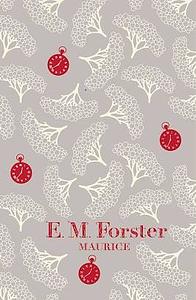You need to sign in or sign up before continuing.
Take a photo of a barcode or cover
emotional
reflective
slow-paced
Plot or Character Driven:
Character
Strong character development:
Complicated
Loveable characters:
Yes
Diverse cast of characters:
No
Flaws of characters a main focus:
Complicated
a little sexist but otherwise good
This is a book I respect much more than I like. It is perhaps most analogous to Bertram Cope's Year, but far less funny, another gay novel of over a hundred years ago. Maurice as a character is milquetoast, while Clive is frustrating, and Alec is a deus ex machina. All female characters do not feel human. If anything, this book highlights just how rigid and formal class structure was of the time, making modern historical novels, like In Memoriam seem completely false.
Forster mentions in the ‘Terminal Note’ at the end of the novel that the principal characters of the novel are three men -Maurice, Clive, and Alec. There is another character that is as central as the titular one, the country England itself, all with its sensibilities and cruelties -both being one and the same at times. Maurice’s closest relationship is with the country, and that doesn’t change despite everything. At no point in his years long ordeal does he falter. It’s him who has something wrong about him. If he ever questions it, it’s in hope it will accept him and never to reprimand it for making him feel like an outcast.
Maurice is not ruminative. Both Maurice and his first companion know this. That could be why he doesn’t understand or accept himself and imposes cruel sentences of English sensibility on himself. He is no stand in for an ideal; no grander point is driven home by the end. This is a man who is as unnoticeable as can be, except the nature of his love. And that, above all else, makes him leap of the pages. The depth of his misery aches the reader’s heart; it doesn’t engage the mind as much but still manages to hold us through the story.
Surrounded by convention, jailed by it with the bars shrinking with each passing misery, Maurice showcases a hope that is as real as anything I’ve read. This realness is a function of that silent fourth character. If it wasn’t there, the novel would be a generic romance novel written a million times. It has all the trapping of a generic romance novel: Young, uncertain love, the briefness of it, the break, the hope of it being rekindled, the growth that follows that false hope… and everything else. What separates Maurice from them is the world that’s as realized in it as the characters. The world of Maurice is thicker than air. Of course, the main players can’t perceive it as such, but to a modern reader, it is all too evident, visible in the mind’s eye.
Forster dedicates the novel “To A Happier Year”. To realize this vision, he shelves Maurice upon completion, only showing it to a few select people in his close society. Persecution was on his mind, as it could be on any sensible mind. Oscar Wilde has been dead for 15 years when Maurice was completed. Persecution for homosexual love is as another big driver of the novel. Maurice, the character, doesn’t want to think about it, but English Sensibility imposes this on him as it does on the other characters and ultimately, the course of love itself in the novel. Perhaps Forster wanted to wait for a more liberal time, but then Radclyffe Hall published The Well of Loneliness 15 years after Maurice was completed. A sad ending almost seems inevitable in such lives in those times. The original ending of Maurice shared this sentiment, ending the novel on a sombre note of disturbing the tranquil life Maurice Hall has built with his lover. Call it an act of rebellion or artistic foresight, Forster abandoned that ending for a happier one. He wasn’t dedicating the novel to a happier year; he was making a toast.
Maurice is not ruminative. Both Maurice and his first companion know this. That could be why he doesn’t understand or accept himself and imposes cruel sentences of English sensibility on himself. He is no stand in for an ideal; no grander point is driven home by the end. This is a man who is as unnoticeable as can be, except the nature of his love. And that, above all else, makes him leap of the pages. The depth of his misery aches the reader’s heart; it doesn’t engage the mind as much but still manages to hold us through the story.
Surrounded by convention, jailed by it with the bars shrinking with each passing misery, Maurice showcases a hope that is as real as anything I’ve read. This realness is a function of that silent fourth character. If it wasn’t there, the novel would be a generic romance novel written a million times. It has all the trapping of a generic romance novel: Young, uncertain love, the briefness of it, the break, the hope of it being rekindled, the growth that follows that false hope… and everything else. What separates Maurice from them is the world that’s as realized in it as the characters. The world of Maurice is thicker than air. Of course, the main players can’t perceive it as such, but to a modern reader, it is all too evident, visible in the mind’s eye.
Forster dedicates the novel “To A Happier Year”. To realize this vision, he shelves Maurice upon completion, only showing it to a few select people in his close society. Persecution was on his mind, as it could be on any sensible mind. Oscar Wilde has been dead for 15 years when Maurice was completed. Persecution for homosexual love is as another big driver of the novel. Maurice, the character, doesn’t want to think about it, but English Sensibility imposes this on him as it does on the other characters and ultimately, the course of love itself in the novel. Perhaps Forster wanted to wait for a more liberal time, but then Radclyffe Hall published The Well of Loneliness 15 years after Maurice was completed. A sad ending almost seems inevitable in such lives in those times. The original ending of Maurice shared this sentiment, ending the novel on a sombre note of disturbing the tranquil life Maurice Hall has built with his lover. Call it an act of rebellion or artistic foresight, Forster abandoned that ending for a happier one. He wasn’t dedicating the novel to a happier year; he was making a toast.
What a wonderful, wonderful story; simultaneously heartbreaking and uplifting. Forster's afterword from 1960 was painful, too; I wonder what he would have said on the same topic today.
A rare (very rare) occasion where the last third of a book saves it instead of ruining it.
On a mission to read more classic queer literature, so this has been on my list for a while. Since it was first written in 1913 the writing is jumbled and difficult for me to follow, but I grasped the characters and the plot well enough, and I was satisfied by the ending.
“Masses of work awaited him. Nothing had changed in his life. Nothing remained in it. He was back with his loneliness as it had been before Clive, as it was after Clive, and would now be for ever. He had failed, and that wasn't the saddest: he had seen Alec fail. In a way they were one person. Love had failed. Love was an emotion through which you occasionally enjoyed yourself. It could not do things.”
RIP Clive you should’ve listened to “good luck babe!” Because that’s exactly the life you ended up with babe. I feel bad for you broski because my ass was lowkey rooting for you and Maurice but noooo you have to go and convince yourself you’ve been “cured” and then you made Maurice freak out for like the rest of the book until bro was like “well, I guess I’m not even gonna like girls. Might as well give this fellow named Alec a shot.” Then they fell in love happily ever after. Clive you are my enemy, because my ass cannot tell if you actually like Anne that way or no, but for the sake of my sanity I’m going to go with the fact that I could treat her much better than you.
Now Maurice you poor poor human. I love you as much as I want to smack the shit out of you. I’m leaving that there.
I would rate this higher however I found myself pretty bored with the books after Clive decided he wasn’t going to be attracted to men anymore
RIP Clive you should’ve listened to “good luck babe!” Because that’s exactly the life you ended up with babe. I feel bad for you broski because my ass was lowkey rooting for you and Maurice but noooo you have to go and convince yourself you’ve been “cured” and then you made Maurice freak out for like the rest of the book until bro was like “well, I guess I’m not even gonna like girls. Might as well give this fellow named Alec a shot.” Then they fell in love happily ever after. Clive you are my enemy, because my ass cannot tell if you actually like Anne that way or no, but for the sake of my sanity I’m going to go with the fact that I could treat her much better than you.
Now Maurice you poor poor human. I love you as much as I want to smack the shit out of you. I’m leaving that there.
I would rate this higher however I found myself pretty bored with the books after Clive decided he wasn’t going to be attracted to men anymore
Listened to the audiobook and it bothered me a lot that Ben Whishaw mispronounced Maurice every single time. It's not Morris, Mr Whishaw.
For any gay male who loves romantic classics such as "little women" or "pride and prejudice" this novel is for you! A must, in my opinion! My new favorite.
Όμορφο βιβλίο.
Αν και για να είμαι ειλικρινής περισσότερο ενδιαφέρον το βρήκα λαμβάνοντας υπόψη τα σημειώματα του συγγραφέα στο τέλος, το πότε γράφτηκε και το πότε εν τέλει εκδόθηκε, ακόμη και την αφιέρωση στην αρχή.
Αν και για να είμαι ειλικρινής περισσότερο ενδιαφέρον το βρήκα λαμβάνοντας υπόψη τα σημειώματα του συγγραφέα στο τέλος, το πότε γράφτηκε και το πότε εν τέλει εκδόθηκε, ακόμη και την αφιέρωση στην αρχή.






